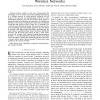Free Online Productivity Tools
i2Speak
i2Symbol
i2OCR
iTex2Img
iWeb2Print
iWeb2Shot
i2Type
iPdf2Split
iPdf2Merge
i2Bopomofo
i2Arabic
i2Style
i2Image
i2PDF
iLatex2Rtf
Sci2ools
JSAC
2007
2007
Grouping and partner selection in cooperative wireless networks
— Various results to date have demonstrated the advantages of one or several relay nodes assisting transmissions in a wireless network. In many practical scenarios, not all nodes in the network are simultaneously involved in every transmission; therefore, protocols are needed to form groups or subsets of nodes for the purposes of cooperation. We consider this problem in the context of regenerative nodes and non-altruistic cooperation (all nodes have data of their own to transmit). For a network-wide diversity advantage, the protocol must provide each transmitting node with enough “partners” that can decode its message with high-enough probability. Assuming that the nodes cannot communicate their control decisions (distributed scenario), and that each node chooses to help n other nodes, we point out a simple, static selection strategy that guarantees diversity n+1 for all transmissions. We then consider centralized control strategies and study the additional gains that arise from ...
| Added | 16 Dec 2010 |
| Updated | 16 Dec 2010 |
| Type | Journal |
| Year | 2007 |
| Where | JSAC |
| Authors | Aria Nosratinia, Todd E. Hunter |
Comments (0)

